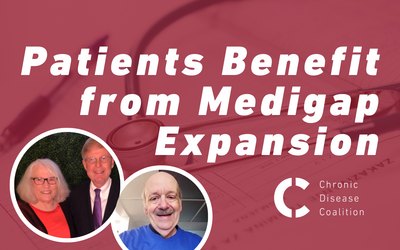
Learn more about medigap and hear from patients at this month's Chronic University session.
What is Medigap?
Medigap plans (or Medicare supplemental insurance policies) cover some of the medication and treatment costs that traditional Medicare does not pay. The policies are offered through private insurance companies. Any American over the age of 65 can get Medicare and buy a Medigap plan.
The story is different for Medicare patients under 65, many of whom are living with a chronic illness. Although they qualify for Medicare, depending on their state, they may be barred from buying a Medigap plan. They also may be forced to pay a higher rate than other Medicare patients.
What it does—and doesn’t— cover
Medigap policies typically cover what Medicare does not, such as copayments, coinsurance, and deductibles. This includes the 20% not covered by Medicare Part B for outpatient services (e.g., dialysis). Medigap does not cover long-term care, vision or dental care, hearing aids, or private nursing services. And sometimes, states allow insurers to turn away residents with certain diseases.

Why this matters for chronic disease patients
Chronic disease patients and their families need this lifesaving coverage. Healthcare costs can break families, and Medigap coverage is an essential tool in managing those costs.
Federal law doesn’t require insurers to sell Medigap to those under 65, but state law can. Some states are already 1) requiring insurers to provide Medigap to all Medicare patients, regardless of age and 2) requiring insurance companies charge the same rate, regardless of age.
The Chronic Disease Coalition is working to expand Medigap coverage in individual states, ensuring all chronic disease patients have access to this critical coverage. We also support a federal fix that covers all Americans and eliminates the uneven access across states.